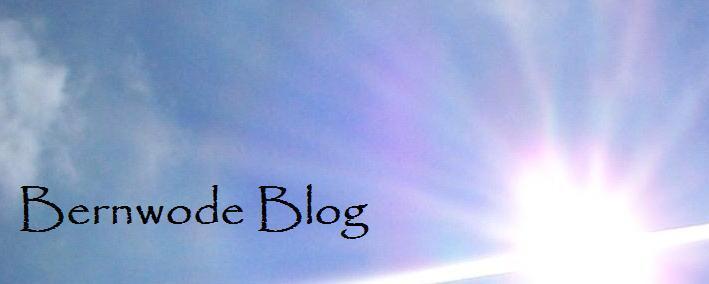Today, I’d like to concentrate on the Gospel reading which
is another parable from Matthew - The Parable
of the Wheat and the Weeds . It is difficult for me to preach on parables,
because I think Jesus used them, at least in part, to get people thinking, to
cause them to muse on them over the next few days, wondering what they mean and
how they relate to them. My hope and expectation is that the Holy Spirit will
cause each of us to spot something in the parable that relates to us or
encourages us or challenges us, and therefore my expectation is that we could
each go away with a different interpretation of what Jesus was saying. In fact
I would consider that to be a great success if that happened.
For this reason, it is normally thought that the ‘explanations’
of the parables are probably later additions to the gospel of Matthew, written by
the second generation of Christians. Matthew’s gospel is thought to have been
written in AD80, sometime after the fall of the Temple in AD70 so it is indeed possible
that there was input from second generation Christians.
So what does this parable mean to you? I wonder whether you
love it or hate it? I guess I have both reactions to it.
I love it because, for me it goes some way to answering the question of why God lets suffering and
difficulty continue in the world. It is because the two grow so close together,
they have their roots entwined, pull up the weeds and you will pull up wheat
too… It isn’t so easy to separate suffering and blessing, and so often one leads
to the other. And so the parable reminds me get on with life, amongst the
suffering and difficulty, because there is no such thing as a weed free field
this side of eternity. The parable also reminds me that God is patient with me.
There are a lot of weeds growing in my heart, as well as some wheat. God takes
the rough with the smooth when it comes to Lesley, and the same with any of you
that are aware of your failings. God won’t be rough with us. There is a lovely
verse in Isaiah 42 that says:
‘A bruised reed he will not break, and a smoldering wick he
will not snuff out.’
So, in some ways this is my favourite parable, a word of
comfort from a gentle God. But, on the other hand you could see a theology that
is called ‘predestination’ in it. This is a theology that some of the reformers
expounded when the Protestant churches broke away from the Catholic church. It
is often attributed to a man called Calvin, and hence you may meet ‘Calvinists’
who have this theology. The idea is that God, before time, decided who would go
to heaven – called ‘the elect’ and who would go to Hell – called ‘the reprobate’,
and then the two groups live together, one forever predestined for glory and
the other forever predestined for eternal damnation. Needless to say, I don’t
believe in a God like this. But I guess, if I did, then the parable tells us
that all we can do is grow, thrive and not judge others because at the end of the day it is only God
who knows what is wheat and what are the weeds.
I should probably have said earlier that the parable partly
relies on the idea that it is very difficult to tell what is wheat and what are
the weeds, as it is thought that the weeds were a plant called ‘darnel’ which
initially looks very similar to wheat. In preparing this sermon I have noticed
some more ideas about this parable that feel helpful.
For a start Jesus is very black and white here – there are
two types of crop, good quality wheat and useless weeds. There are two main characters
involved, the good farmer and the fiendish enemy. There are two times of day –
the farmer in the daytime and the enemy under the cover of night. There are two destinations – the wheat in the
barn or the weeds in the fire.
So it is tempting, isn’t it, to be black and white
ourselves? Throughout church history, there have been people who are quite
clear about what is good doctrine and what is bad, and the bad has been plucked
out and the offending books have been burned. Indeed Jesus was accused of
having false doctrine. There have been people who are quite clear about who are
good Christian leaders and who are bad, and the bad ones have been plucked out
and burned at the stake. Indeed Jesus was crucified for being a false messiah. There
are people who have been quite clear about what worship is good and what is
bad, and the false altars have been pulled down and burned in the fire. Indeed Jesus was denounced for encouraging
false worship. There have been people who are quite clear about good and bad
lifestyles and those with bad lifestyles have been plucked out and burned in
the fire. And yet Jesus said that he died to save sinners, not to condemn them.
The Wheat and the weeds are to grow up together . The weeds are not to be
plucked out.
To save.. not to condemn.. That challenges me. Who have I
condemned? Who have we as a church condemned? How about through the ages – the crusades,
the inquisition – the church has done much plucking.
I heard a story about a church who had a sponsored walk and
one of the lads did the walk in a Tutu and carrying a rainbow flag. So they
airbrushed him out of the photos because they didn’t want to promote
homosexuality. Who do I airbrush out? Do I airbrush out Jesus’ friends in the
Gospel? The tax-collectors, the prostitutes, the sinners? Perhaps it is frankly
tidier to airbrush Jesus out because he can be a bit embarrassing sometimes.
This parable is a parable of Tolerance. Life is messy. I
should expect to find myself surrounded by ‘weeds’ (arrogantly presupposing
that I am ‘wheat’), people who have different values, who challenge me,
irritate me, unnerve me. To be honest, that isn’t my experience recently. So
where are they? Have I plucked them out? I will be saying this a lot, but if
there is one thing this Benefice has taught me, it is the power of acceptance
and love. Perhaps as life goes on I will learn that more and more and
consequently find more and more weeds surrounding me!
I hope you have found something in this parable that the
Holy Spirit is trying to tell you. I know I have. I hope God continues to bless
you richly through this parable this week.









